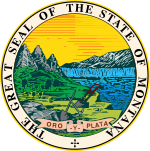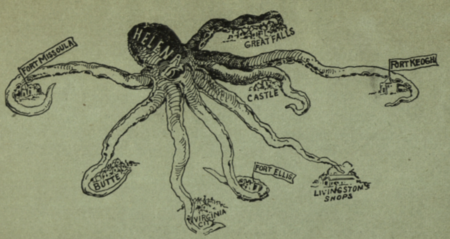Montana capital referendum
| Elections in Montana |
|---|
 |
In the 1890s, the state of Montana held a referendum to select its capital city. The first round was held in 1892 between several cities, and since none won outright, a second round was held in 1894. After an expensive and negative campaign, Helena was selected as the capital over Anaconda by a margin of around 2,000 votes (3.6 percent).
Background
In 1891, Montana legislators passed a bill to select a capital city by referendum in the general election of 1892; if no city were to win a majority, then a second referendum would be held in 1894.[1] The cities of Anaconda, Boulder, Bozeman, Butte, Deer Lodge, Great Falls, and Helena (then the temporary capital) entered the 1892 referendum after collecting enough signatures from residents.[1] In the first round, Boulder received 295 votes; Deer Lodge, 983; Great Falls, 5,049; Bozeman, 7,685; Butte, 7,752; Anaconda, 10,183; and Helena, 14,010.[2] As no city won the referendum outright, the two cities with the highest share of the vote—Helena and Anaconda—were entered to compete in the general election of 1894.[3]
Campaign

Both Helena and Anaconda were problematic cities for voters.[4] Where Helena, as the temporary capital, had been embroiled in political dysfunction,[A] Anaconda was perceived as a working-class, industrial city under the control of Marcus Daly and his corporations.[6]
During the campaign season of September and October 1894, newspaper editorials in favor of a city were printed, and political memorabilia—including campaign buttons and banners—were minted.[7] Organizations to promote cities were formed, and rallies were held to distribute campaign materials.[7] Negative campaigning was prominent, with supporters of Helena decrying Anaconda as a socially inferior city that was beheld to a corporate business class, and with Anaconda supporters condemning Helena as a pretentious city of politics that did not possess a meaningful economy.[7] Butte's Populist Tribune, for instance, framed the referendum as a question of accepting "Helena dictatorship" over the people, and Helena's Colored Citizen[B] warned that Anaconda was ruled by the same interests that "has always crushed out the black man from every factory or workshop".[9]
There were far fewer women in Anaconda than in Helena—supporters of its bid thought the settlement of women was beneficial because it could harbor a permanent population, but opponents believed it produced effeminate men.[11] Helena's Social Supremacy, a satirical pamphlet that sought to debase Helena's image, said that where the city consumed 17,669 Manhattan cocktails daily, Anaconda consumed just 127; where Helena had 774 "ladies with poodle dogs", Anaconda had none; and where Helena possessed 1,343 "skeletons in closets", Anaconda possessed 16.[12]
Results
In November 1894, Helena was chosen over Anaconda by a margin of around 2,000 votes: Helena received 27,024 votes (51.8% of the total), and Anaconda received 25,118 (48.2%).[13] The total cost for the campaigns was between $1 and $2 million,[C] in part because of their elaborate campaign strategies—which included fireworks, memorabilia, and coins.[14] One of the prominent campaigners for Helena's bid, William A. Clark, reportedly celebrated the results by purchasing Helena's residents drinks at a cost of $30,000.[D][14]
Notes and references
Notes
- ^ Early Montana legislatures were chaotic, with deadlock only addressed through precarious political compromises.[5]
- ^ A paper for the African American community of Montana, the Colored Citizen was financed heavily by the Republican Party and was established specifically for the election.[8] The paper was anti-immigrant; its editor stated that Anaconda's mining companies preferred "Dagoes and foreigners to native colored Americans".[9] After the election, the paper dissolved.[10]
- ^ Equivalent to $31–$63 million in 2021.
- ^ Equivalent to $939,577 in 2021.
Citations
- ^ a b Anaconda Standard 1917, p. 2; Lang 1987, p. 38.
- ^ Lang 1987, p. 39.
- ^ Anaconda Standard 1917, p. 2.
- ^ Lang 1987, p. 43.
- ^ Lang 1987.
- ^ Lang 1987, pp. 43–44.
- ^ a b c Lang 1987, p. 44.
- ^ Leech 2008, p. 9.
- ^ a b Lang 1987, p. 45.
- ^ Taylor 1979, p. 346.
- ^ Leech 2008, pp. 6–7.
- ^ Newby 1987, p. 69.
- ^ Leech 2008, p. 12.
- ^ a b Malone 1983, p. 10.
Bibliography
- Lang, William L. (1987). "Spoils of statehood". Montana: The Magazine of Western History. 37 (4).
- Leech, Brian (12 April 2008). "Hired hands from abroad": The populist producer's ethic, immigrant workers, and nativism in Montana's 1894 state capital election. James A. Rawley Graduate Conference in the Humanities — Imagining communities: People, places, meanings. Lincoln, NE. pp. 1–21.
- Malone, Michael P. (1983). "Midas of the West: The incredible career of William Andrews Clark". Montana: The Magazine of Western History. 33 (4): 2–17. ISSN 0026-9891. JSTOR 4518776.
- Newby, Rick (1987). "Helena's Social Supremacy: Political sarcasm and the capital fight". Montana: The Magazine of Western History. 37 (4): 68–72. ISSN 0026-9891. JSTOR 4519094.
- Taylor, Quintard (1979). "The emergence of black communities in the Pacific Northwest: 1865–1910". The Journal of Negro History. 64 (4): 342–354. doi:10.2307/2716942. JSTOR 2716942. S2CID 132137921.
- "How lone Chinaman nearly won election". Anaconda Standard. 3 June 1917.